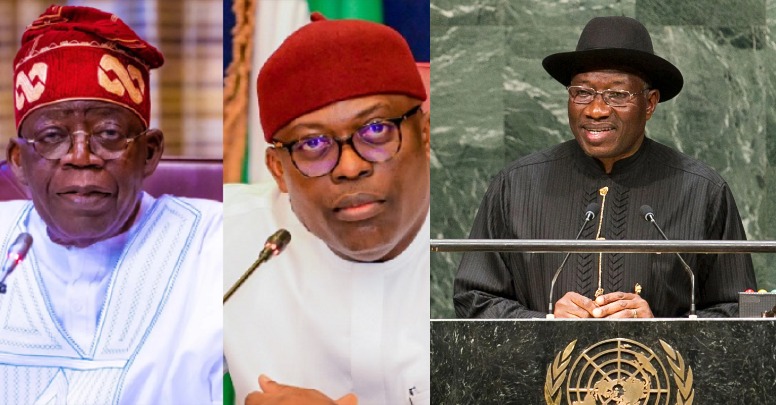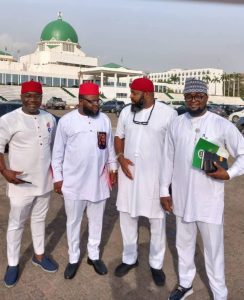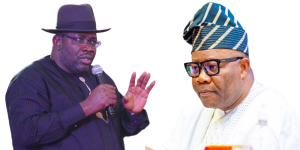These actions paint the country in a negative light – GEJ reacts to State of Emergency Declaration in Rivers state
The declaration of a state of emergency in Rivers State by President Bola Ahmed Tinubu on March 18, 2025, has sparked a wave of reactions across the political spectrum, both within Nigeria and internationally. The decision, which led to the suspension of the state’s Governor, Siminalayi Fubara, his deputy Professor Ngozi Odu, and members of the State House of Assembly for six months, has been the subject of intense scrutiny and debate. The announcement also saw the appointment of a sole administrator for the state. While the reasons for the state of emergency were framed as a response to a protracted political crisis in the region, former President Goodluck Jonathan has expressed grave concerns over the long-term implications of these actions.
Jonathan, who served as the President of Nigeria from 2010 to 2015, is no stranger to Nigeria’s political challenges. His tenure was marked by a series of complex national issues, including security concerns, electoral disputes, and political fragmentation. However, his reaction to the current developments in Rivers State reveals a broader concern about Nigeria’s governance, the country’s international image, and the state of its democracy. Speaking as the Chairman at the Haske Satumari Foundation Colloquium in Abuja on March 22, 2025, Jonathan outlined his position on the declaration of the state of emergency and the suspension of elected officials in Rivers State. In his address, Jonathan was forthright in his condemnation of the actions taken by the Nigerian government, stressing that such moves could damage the nation’s reputation on the global stage.
Jonathan’s primary concern centers around the suspension of democratically elected officials in Rivers State. He emphasized that, in any democratic society, elected officials must be allowed to complete their mandates unless there are compelling legal or constitutional reasons to remove them from office. The suspension of Governor Fubara, his deputy, and the members of the state legislature, he argued, undermines the principles of democracy by effectively stripping the people of Rivers State of their right to choose their representatives and hold them accountable. This, Jonathan suggested, sets a dangerous precedent for governance in Nigeria.
While acknowledging the challenges faced in Rivers State, Jonathan questioned the legitimacy of using an executive order to suspend elected officials without the clear involvement of the judiciary or the legislature. In his view, such actions not only weaken the democratic process but also send a message to Nigerians and the world that political solutions are being imposed through executive fiat, rather than through the normal democratic institutions and processes.
“Democracy is about giving the people the freedom to choose their leaders,” Jonathan stated. “When you bypass that process, when you suspend the very essence of democratic governance, you send the wrong message to the people, and you paint the country in a negative light.”
Jonathan’s remarks reflect a deep concern about the erosion of democratic institutions and processes in Nigeria. While he refrained from offering specific solutions in his speech, it was clear that he viewed the suspension of Rivers State’s elected officials as a troubling development for the country’s political future.
Jonathan also highlighted the negative impact of the state of emergency declaration on Nigeria’s international reputation. According to him, the image of a country is shaped not only by its leadership but by the actions of its government institutions, including the judiciary, legislature, and executive. He stressed that such drastic measures as the suspension of elected officials, especially when done in a manner that appears arbitrary, would deter foreign investment and damage Nigeria’s standing on the global stage.
For Jonathan, the reputation of Nigeria is paramount, as it directly affects the country’s ability to attract foreign investment, foster international partnerships, and engage in diplomatic relations. He pointed out that international investors and global institutions closely monitor the political environment in any country before making decisions on trade, investment, and collaboration. When countries experience instability or when there is a lack of confidence in the fairness and independence of their political institutions, potential investors are often hesitant to engage.
“We must always be conscious of how our actions affect our country’s image,” Jonathan said. “When key actors in government take actions that appear to be politically motivated or unjust, it harms Nigeria’s reputation and sends a signal to the international community that we are not a country that values democratic principles and the rule of law.”
Jonathan’s concerns echo broader anxieties about Nigeria’s place in the world and its ongoing struggle to build a stable and prosperous democracy. Over the years, Nigeria has faced criticism from the international community for various issues, including corruption, security challenges, and political instability. While the country has made strides in improving its image, incidents like the one in Rivers State threaten to undo some of the progress that has been made.
One of the most critical aspects of Jonathan’s speech was his comment on the independence of the judiciary. He expressed concern about the growing trend of executive interference in judicial matters, particularly in cases where key political figures seek to dictate judicial outcomes. Jonathan emphasized that for any country to function as a true democracy, its judiciary must be independent and free from political influence. He argued that actions like those taken in Rivers State undermine the rule of law and make it difficult for Nigerians to trust the judicial system.
The statement came at a time when there has been increasing concern in Nigeria about the politicization of the judiciary. Critics have long alleged that the judiciary is subject to political influence, with some arguing that judges are often swayed by the interests of the ruling party. Jonathan’s comments were a reminder of the importance of maintaining an impartial and independent judiciary as a cornerstone of Nigeria’s democratic system.
“When individuals can dictate to the judiciary, it erodes trust in the legal system,” Jonathan stated. “The rule of law is the foundation of democracy, and we must protect it at all costs.”
The political situation in Rivers State, which ultimately led to the declaration of a state of emergency, has been fraught with tensions for months. Governor Siminalayi Fubara, a member of the People’s Democratic Party (PDP), has faced political opposition from various quarters, including members of his own party, the All Progressives Congress (APC), and local political elites. The state has witnessed protests, violence, and confrontations between rival political factions, which has made it difficult to maintain order and stability.
The federal government, under President Tinubu, has cited the ongoing political crisis in the state as the justification for the suspension of elected officials and the imposition of a state of emergency. President Tinubu argued that the situation in Rivers State had reached a point where the continued functioning of the state government was untenable, and that a state of emergency was the only solution to restore order and prevent further violence.
However, critics of the decision, including Jonathan, argue that declaring a state of emergency in Rivers State is an overreach of executive power and a failure to engage with the root causes of the political crisis. While acknowledging the need for peace and stability in the state, Jonathan and other critics contend that such measures should be used as a last resort, and only after all other avenues for resolving the crisis have been exhausted.
The imposition of a state of emergency, Jonathan suggested, is a reflection of broader challenges in Nigeria’s political system, where political conflicts are often resolved through heavy-handed state interventions rather than dialogue and consensus-building. He emphasized that Nigeria’s democracy would only thrive if its political leaders could work together to address the root causes of conflict and instability, rather than resorting to unilateral decisions that further alienate sections of the population.
As the situation in Rivers State continues to unfold, international observers are closely watching developments in the country. Nigeria, as Africa’s most populous nation and one of its largest economies, has a significant impact on the political and economic dynamics of the continent. Given the global interest in Nigeria’s governance and its ability to manage political crises, the actions of the Nigerian government in Rivers State are likely to have far-reaching implications.
Former President Jonathan’s remarks underscore the importance of Nigeria maintaining a stable and transparent political environment. In his view, the international community must hold Nigeria accountable for upholding democratic values and respecting the rights of its citizens. At the same time, he urged Nigerians to remain hopeful and to continue striving for progress, despite the challenges facing the country.
The crisis in Rivers State highlights the ongoing struggles Nigeria faces in balancing political power, maintaining stability, and fostering democratic governance. For Jonathan, the solution lies in strengthening the institutions of democracy, including the judiciary, the legislature, and the executive, and ensuring that all actions taken by government officials are in the best interest of the Nigerian people.
As Nigeria moves forward, Jonathan’s call for caution, dialogue, and respect for the rule of law should serve as a guiding principle for leaders across the country. It is only through collective effort and a commitment to democratic values that Nigeria can overcome its political challenges and emerge as a stronger, more united nation on the global stage.
These actions paint the country in a negative light – GEJ reacts to State of Emergency Declaration in Rivers state
Former president, Dr. Goodluck Jonathan, has said that the suspension of Governor Siminalayi Fubara, and other elected officials of Rivers State, dents Nigeria’s image.
The former Nigerian leader said this while speaking as the Chairman at the Haske Satumari Foundation Colloquium in Abuja on Saturday, March 22.
“These actions by key actors in the executive and legislative arms of government paint the country in a negative light.”
He said it was not the norm for former presidents to comment on issues, so as not to heat up the polity. He, however, added that his comment became necessary after calls from many Nigerians, urging him to speak on the events in Rivers State.
He added that the image of the country and how much investments a country attracts is dependent on the actions of the executive, legislature and judiciary of that country.
Goodluck Jonathan faulted the situation where an individual can dictate to the judiciary, noting that it makes it difficult for anyone to have faith in the judiciary.
On Tuesday March 18, President Tinubu declared a State of Emergency in Rivers state following the protracted political crisis in the state.
In a nationwide broadcast. the President announced the suspension of Gov Fubara, his deputy Professor Ngozi Odu and the state House of Assembly members for six months and the appointment of a sole administrator for the state.
Source: LIB





